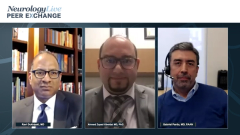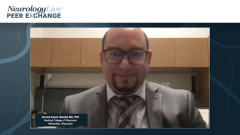
Patient Case #2: 36-Year-Old Female With RRMS With Lesions in the Spine and Brain
Ravi Dukkipati, MD, and Gabriel Pardo, MD, FAAN, review the use of rituximab and other disease-modifying therapies in a patient with an established diagnosis of relapsing/remitting multiple sclerosis.
Episodes in this series

Ahmed Zayed Obeidat MD, PhD: We’re going to talk about another patient, a 56-year-old woman diagnosed with relapsing/remitting multiple sclerosis [MS] 5 years ago. This is a patient with an established diagnosis. She initially presented with weakness and numbness in her legs and vision changes—some sort of optic neuritis. An MRI showed active lesions at the time in her brain and spinal cord, leading to the diagnosis of relapsing MS. She had lesions in the spine and the brain. After the initial diagnosis, they started her on rituximab, and she experienced significant improvement in her symptoms.
But over the past year, she has had several relapses on rituximab, which is a little unusual, with new symptoms—difficulty walking, bladder dysfunction, fatigue, some motor and sphincter dysfunction. Dr Pardo, because you talked about rituximab, do you agree with the use of rituximab for this patient? If not, what treatment you would be selecting? We know rituximab is off-label.
Ravi Dukkipati, MD: I was about to ask if this is a trick question.
Ahmed Zayed Obeidat MD, PhD: Maybe.
Gabriel Pardo, MD, FAAN: Rituximab is off-label, but the mechanism of action—the suppression of CD20 B cells—has proven to be an effective way of treating multiple sclerosis. It’s used extensively in other countries. It’s the preferred agent in many countries, especially in northern Europe. There’s good evidence, even though we don’t have well-conducted phase 3, longitudinal, double-blind studies to prove that, there’s a good amount of evidence that supports the use of rituximab. I could have used it. Do I use it commonly or routinely? No, I don’t because I have other anti-CD20s that have been studied in that setting, have been approved, and have the indication. I’ll go with that. But I will accept rituximab, even generic rituximab or biosimilar rituximab, in a patient with multiple sclerosis.
As you mentioned, it’s unusual for us to see breakthrough inflammatory disease with anti-CD20s. They’re highly effective, but they’re not 100%, as is being demonstrated by this patient. This poses the conundrum of what else to do because we’re already using a highly effective medication. Within that category of highly effective therapies, we have different mechanisms of action that we can go to. Another example will be natalizumab, another monoclonal antibody with high efficacy with very good control of inflammatory activity, which is something we can consider.
Another monoclonal antibody that we haven’t used as much as we used to but is still an option is alemtuzumab, which has a very good effect in studies on acute inflammation but also on long-term outcomes. It has its own can of worms, with the potential induction of other autoimmune diseases, but in select patients it’s still a good option. Even oral cladribine is another option that I can continue in a patient like this with high efficacy, and that can give us a fast benefit. We have a patient who’s having problems, and we’d like not to take the path of an agent that’s going to take months to give us the benefit. We’d like to see this benefit ensue rapidly.
Ahmed Zayed Obeidat MD, PhD: I like that you mentioned that there are other options, even failing rituximab. I would also use rituximab for MS even off-label because of the vast data that we have. It can still be a valuable option. One other possibility is autologous hematopoietic stem cell transplantation for this patient. It could be a failure through an anti-CD20. That would be 1 because this patient is highly active, is young, and has motor difficulties already and many active lesions. That could be another valuable option for her. Dr Dukkipati, any other thoughts on this? Would you have used rituximab?
Ravi Dukkipati, MD: I agree with what you both said. I don’t think I would’ve chosen rituximab first line, but whoever did is not faulted. It’s a very effective class. But if a patient is failing rituximab, this isn’t the patient I’d switch to ocrelizumab or ofatumumab. I’d probably venture to another class with the hope that a slightly different mechanism of action may prevail and provide better efficacy.
To Dr Pardo’s point, natalizumab is a superb option. Cladribine is under-recognized, but it is a high-efficacy drug and provides a unique mechanism. That’s an option in addition to alemtuzumab while off-label: autologous stem cells.
Ahmed Zayed Obeidat MD, PhD: Here I’m thinking about how can I affect the T cells in addition to the B cells, right?
Ravi Dukkipati, MD: Right.
Ahmed Zayed Obeidat MD, PhD: Cladribine, alemtuzumab, autologous hematopoietic stem cell transplant; and then natalizumab, where you’d block those cells from going. Those are great options in the thinking process. Thankfully, we rarely see patients like this who are failing anti-CD20 in practice with relapses.
Transcript edited for clarity
Newsletter
Keep your finger on the pulse of neurology—subscribe to NeurologyLive for expert interviews, new data, and breakthrough treatment updates.














